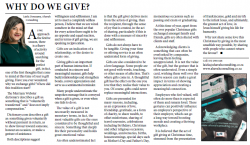Laiela Dorasamy - Why Do We Give2019-11-26 As we approach the festive season, there is a flurry of activity around searching for the perfect gift, in fact, one of the first thoughts that come to mind at this time of year is gift giving. Have you ever wondered why we exchange gifts? Where did this tradition start? The Merriam Webster dictionary describes a gift as: something that is "voluntarily transferred" and "does not imply compensation." Dictionary.com describes a gift as: something given voluntarily without payment in return, as to show favour toward someone, honour an occasion, or make a gesture of assistance. Both descriptions suggest willingness and selflessness. I am yet to meet a completely selfless person, I believe that we are wired somehow in the mind-set that for every action there ought to be an opposite and equal reaction, and in terms of gift giving, we are speaking reciprocation. Gifts are an indication of a relationship, or the desire to create one. Giving gifts is an important part of human interaction. If conducted in a sincere and meaningful manner, gifts help build relationships and strengthen bonds, convey appreciation and serve as a sentimental reminder. Many people underestimate the unspoken message that is conveyed when a gift is given, or even when one fails to do so. The value of a gift is not necessarily measured in monetary terms, in fact, the most valuable gifts are the ones considered to be thoughtful and sincere. Something that deeply fits their personality and holds great emotional value. An often underestimated fact is that the gift giver derives more from the action of giving, than the recipient, through the sense of joy that is created, in the act of sharing, particularly if this is done with a measure of sincerity and selflessness. Gifts do not always have to be tangible. Giving your time or offering service is an often underrated form of giving. Gifts are also considered to be a love language. Some people are not good with words, touching, or other means of affection. That's where gifts come in. A thoughtful gift has the effect on the one you love that they realise their value to you. Of course, gifts could never replace meaningful interactions. Gifts are presented for many reasons, including, as an expression of love, friendship, gratitude, as a form of charity, to share wealth, to offset misfortune, sharing of travel souvenirs, celebrations including birthdays, Christmas and other religious occasions, weddings, anniversaries, births, housewarmings, special days such as Mother's Day and Father's Day, momentous occasions such as passing and exam or graduating. At this time of year, apart from the ever popular Christmas gifts exchanged amongst family and friends, gifts are often shared with clients and staff. Acknowledging clients is something that can often be overlooked by companies, leaving them feeling unappreciated. It is not the value of the gift, but the gesture that is often underrated. Even a simple card, wishing them well over the festive season can make a great impact in terms of showing appreciation and creating a meaningful connection. Employees who feel valued, will often do more than is expected of them and remain loyal. These gestures can positively influence an employee's perspective of their employer, which can go a long way toward boosting morale and creating a thriving workplace. It is believed that the act of gift giving at Christmas time, stemmed from the presentation of frankincense, gold and myrrh to the infant Jesus, and ultimately, the greatest act of love, in Jesus himself giving his life for humanity. Why not share some love this Christmas by giving in the most unselfish way possible, by sharing with people who cannot return the favour? Cell: 072 298 0148 laiela@ahavahconsulting.co.za www.ahavahconsulting.co.za |
Laiela Dorasamy - Why Do We Give
Copyright © 2024 KwaZulu-Natal Top Business
